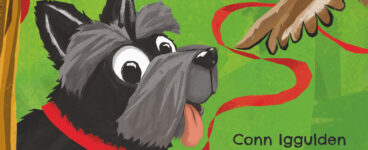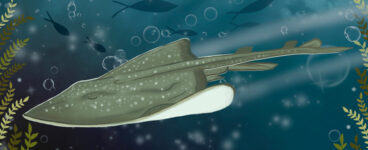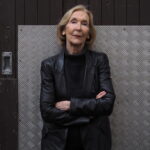‘I need to be obsessed with my characters, to let them take over my imagination until the thoughts translate into words on the page.’
Meredith, Alone by Claire Alexander received many plaudits when it came out in hardback last year, with comparisons to Eleanor Oliphant is Completely Fine. As the paperback comes out this month, BooksfromScotland asked Claire to tell us about her favourite books.
Meredith, Alone
By Claire Alexander
Published by Penguin
The book as . . . memory. What is your first memory of books and reading?
I’ve been reading for as long as I can remember. As a kid I devoured books—it’s without a doubt the best trait I inherited from my mum’s side of the family. By the time I went to secondary school I learned that not all books are written by middle-upper class white people, and a whole new world of literature opened up to me (hello, Toni Morrison and Alice Walker!). But before then, it was pretty much Enid Blyton, Rumer Godden, Frances Hodgson Burnett and Elinor Brent-Dyer on rotation (at least there was never any doubt in my mind that women could write books).
I’m not sure why I was so drawn to books set in boarding schools (St. Clare’s, Malory Towers, The Chalet School). Perhaps because the concept seemed so exotic and exciting to the wee girl in a small Ayrshire seaside town, going to school down the road. No midnight feasts, madcap schemes or thrilling rescues. Certainly no ‘Mam’zelle Abominable’.
I remember reading in bed with a night light after Mum switched the big light out. She knew what I was doing, but she loved that I loved books too much to tell me to go to sleep.
The book as . . . your work. Tell us about your novel Meredith, Alone. What did you want to explore in writing this book?
As always, I didn’t have much of a plan when I started writing the novel. (How I envy authors with spreadsheets and Post-it note wall planners.) What I did know is that I wanted to ask questions about connection, friendship, different types of love. I really started brainstorming when the start date of my online writing course was fast-approaching. That’s when the character of Meredith came to me. At that early stage, she was simply a woman who hadn’t left her home for a very long time—and this was pre-pandemic (October 2019), so the concept was an unusual one. I didn’t know how she’d ended up in this situation or how she was going to get out of it, but I was keen to find out. That’s a good starting place for me when I’m writing. I need to be obsessed with my characters, to let them take over my imagination until the thoughts translate into words on the page. I ended up writing a novel about overcoming trauma in order to live a full life. But also: What is a full life? It’s not the same thing for everyone.
The book as . . . inspiration. What is your favourite book that has informed how you see yourself?
During my angst-ridden teens, when I’d long moved away from boarding school shenanigans, I was drawn to books with, well, angst-ridden characters. Holden Caulfield in J.D. Salinger’s The Catcher in the Rye, Esther Greenwood in Sylvia Plath’s The Bell Jar, Jo March in Louisa May Alcott’s Little Women. I didn’t really know why I felt so connected to them—that became clearer later on when I accepted anxiety and depression as a part of me.
It’s hard to pick a favourite—and it’s none of the above. It’s not fiction, either. The first time I read The Man Who Mistook His Wife for a Hat by Oliver Sacks, I was blown away. Sacks, a neurologist who works with people with especially unusual brain issues, writes without judgement, without dry clinical prose. The stories are told with empathy, love and respect, and the message I take from the collection is that we really don’t understand ourselves (or each other) at all. That was a huge comfort to me as someone who wrestled with the ways I just felt different to everyone else.
The book as . . . an object. What is your favourite beautiful book?
The Diary of Frida Kahlo: An Intimate Self-Portrait by Sarah M. Lowe and Carlos Fuentes is a gorgeous illustrated journal documenting the last ten years of Kahlo’s life. There are dozens of stunning watercolour illustrations alongside the artist’s incredibly entrancing script in brightly coloured inks. From front to back cover, it’s a work of art in its own right.
That one ticks the adult box. But generally when I think of beautiful books, I think of kids’ picture books. I love reading Where the Wild Things Are (Maurice Sendak), Gorilla (Anthony Browne) and My Granny Went to Market (Stella Blackstone and Christopher Corr) to my four-year-old daughter because the illustrations are just so bewitching.
The book as . . . a relationship. What is your favourite book that bonded you to someone else?
I could answer the majority of these questions with Anne of Green Gables by L.M. Montgomery, which would make this an essay about Anne of Green Gables. But there can be no other response to this one. When I first read the series, I was already firmly bonded to my best friend. We met at age three, so I don’t even know what life is like without her in it. Throughout primary school, I realised I wasn’t the only weird kid in the class who liked to read and write for fun. She did, too. And how we adored ‘Anne with an e’. We’d read the books and watch the TV adaptation over and over, quoting lines to each other. Anne gave us a label for our friendship that we embraced wholeheartedly then and now: We were kindred spirits.
The book as . . . rebellion. What is your favourite book that felt like it revealed a secret truth to you?
I read Prozac Nation by Elizabeth Wurtzel in the late nineties when I was studying English Literature. It was the best and worst time to read this particular book. I was massively depressed, adrift, and overwhelmingly lonely. I didn’t know anyone who’d ever felt this way. And then I read Prozac Nation and felt more connected to this young woman who went to Harvard than anyone I’d spoken to, drank with or slept with in my four years at Glasgow Uni. Wurtzel’s account of her own mental health issues made me feel uncomfortable as hell. But also more ‘normal’ than ever.
The book as . . . a destination. What is your favourite book set in a place unknown to you?
Discovering Haruki Murakami’s work in my twenties was such a gift. I’ve still never visited Japan but his books brought his homeland to life for me: Kobe, Hyogo in Hear the Wind Sing… Hakone, Kanagawa in South of the Border, West of the Sun… Tokyo in Norwegian Wood. When I have more freedom to travel, I will spend an entire day strolling along the promenade from Yotsuya to Komagome, observing campus life at Tokyo’s universities.
The book as . . . the future. What are you looking forward to reading next?
I never read books written by other people when I’m working on my own. It’s just asking for trouble—imposter syndrome rears its ugly head and tears quickly follow. So I have a towering pile of TBRs on my bedside table. I can’t wait to dive in when my final draft of book 2 is submitted. Not on the pile due to its magnitude, but definitely near the top of the list, is a recent biography of Sylvia Plath; Red Comet: The Short Life and Blazing Art of Sylvia Plath by Heather Clark is a treat I can’t wait to dive into. On that note, I have my eye on Three-Martini Afternoons at the Ritz: The Rebellion of Sylvia Plath & Anne Sexton by Gail Crowther, but I’ve promised myself I won’t buy any more books until that bedside table tower has diminished a little.
Meredith, Alone by Claire Alexander is published by Penguin, priced £8.99.
ALSO IN THIS ISSUE

 Scotty Plants a Seed
Scotty Plants a Seed
The forests come back if we all plant a seed, The shade and the homes and the air that we need.














